Reviews
Nicholas Ray
USA, 1949
Credits
Review by Cullen Gallagher
Posted on 19 August 2008
Source Columbia Pictures VHS
Categories The Mystic: The Films of Nicholas Ray
Simply put, this is the nightmare of Nicholas Ray: “When life is based on one law: fear. An island of outrage: work and sleep and eat by command; pray by command… Look over the gray fence at the far away hill, look through the bars at the free night, without hope except someday get out, get even.” In Knock on Any Door, lawyer Andrew Morton (Humphrey Bogart), a former child of skid row who was able to overcome circumstance, may be speaking about the experience of juvenile incarceration (which he knows intimately from first-hand experience), but he could very well be enunciating the subjectivity of any of Ray’s protagonists. Fear not only the demons from without, but also from within - as much the capacity for being wronged as for committing wrong - that one may “get out” and successfully “get even.”
Farley Granger’s Bowie, the young lover hardboiled before his time, in They Live by Night (1948); Bogart’s Dix Steele, the screenwriter suspected of murder, from In a Lonely Place (1950); Robert Ryan’s sadistic, tormented cop from On Dangerous Ground (1951); James Dean’s Jim Stark, a ball of adolescent angst and rage, from Rebel Without a Cause (1954): they all share in the same good/bad, innocent/guilty duality as Pretty Boy Nick Romano (John Derek), Morton’s young defendant on trial for sticking up a bar and murdering a police officer. Told in flashback to the jury/audience (who serve as one and the same), Romano’s childhood and adolescence was one of poverty, desperation, and increasing tragedy. The product of his environment - a violent skid row neighborhood, for which all of society is guilty for allowing to exist, according to Morton - Romano’s criminality was less a choice than a lesson learned by watching the world around him.
Ray’s signature touch is that there is no easy condemnation or exoneration for any of these characters. More than just the scripts themselves, Ray is able to elicit startlingly expressive performances from his actors (more expressive than in many contemporaneous films) that challenge any easy judgments from the audience. This uncertainty is enhanced in Knock on Any Door by leaving Romano’s guilt uncertain until the very end of the picture: regardless of our suspicions, we had come to empathize with Romano as a wrongly accused youth, and the revelation of his guilt is a severe blow to both our sense of security as well as certainty. If we are made to connect so emotionally to a criminal, does that mean we are complicit in his crime, as well? In Ray’s world, there is no rooting for the good guy or the bad guy, but an overall sense that such an easy binary is insufficient in the modern world/modern cinema. And insufficient it is, if Ray’s films are any indication (and I believe they are).
If there is any major weakness to Knock on Any Door, it is the idealization of the Emma (Allene Roberts), the “good girl” that falls in love with Romano despite his coming clean about his hoodlum status. That Emma works in a candy store with her single mother is indicative of the film’s overly romanticized notion of “purity”: first, there is the association of candy with childhood innocence; and secondly, there is the lack of a masculine presence in her life, as though there is something inherently “pure” about women, just as there is something “impure” about men. Thus, the presence of Nick Romano is an unavoidable downfall in her life—he is, perhaps, an homme fatale. (In fact, he not only destroys Emma, but the lurid publicity of his case prevents Morton from becoming a partner in the law firm he works for, and his friends that fabricated alibis will no doubt suffer consequences for their perjury).
Mike Wilmington perceptively criticizes Knock on Any Door for the incongruity of Emma’s purity and the moral uncertainty surrounding Romano: “its public display of crime, of a life stripped raw, is the negation of the world of romance and illusion.”1 Ray would perfect this mixture in Rebel Without a Cause: Judy (Natalie Wood) is not so one-dimensional as Emma, nor does her relationship with Jim (James Dean) run parallel to a troubled world (as though some oasis of potential happiness/escape), but is instead deeply enmeshed in their turmoil and desperation. In Ray’s best work - Rebel, In a Lonely Place, and On Dangerous Ground - love never provides the answers: it only complicates and obscures the answers even more.
The third film Ray directed (following They Live by Night and A Woman’s Secret [1949]) but the first to receive theatrical distribution (in February of 1949, with Secret following the next month in March), Knock on Any Door was praised upon its release for “Ray’s direction [which] stresses the realism of the script… and gives the film a hard, taut pace that compels complete attention.”2 As realistic as his direction can be, Ray often uses expressionism to convey the surrealism of violence and the isolation of the oppressed. We watch as the camera takes the perspective of a police cruiser, and as a spotlight catches Nick Romano in a dark alley, it is as though “we” are catching him; in a flashback to his time in reform school, we experience first-hand the brutal punishment of a fire-hose as its torrent hits the camera; and as Romano and Morton receive the judge’s verdict, they stare into the lens of the camera, in the face of the audience, as though it is us delivering his sentence. We are guilty of capture, torture, and judgment: Ray does not allow any passive spectatorship. No one walks away innocent—we are all guilty of something, if even of standing by while injustice, whether institutionalized or in the streets, is allowed to exist. A didactic message, for sure, but one which Ray empathizes with completely—and convincingly.
- Mike Wilmington, “Nicholas Ray: The Years at RKO (Part One)” The Velvet Light Trap (No. 10, Fall 1973) 51. ↩
- Variety (New York: Jan 1949). ↩
More The Mystic: The Films of Nicholas Ray
-
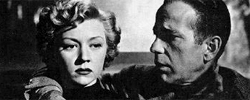
In A Lonely Place
1950 -

They Live By Night
1948 -
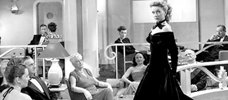
A Woman’s Secret
1949 -
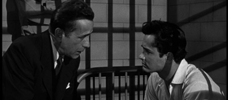
Knock on Any Door
1949 -

Born to Be Bad
1950 -
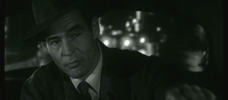
On Dangerous Ground
1952 -
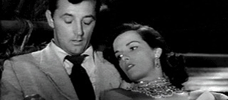
Macao
1952 -
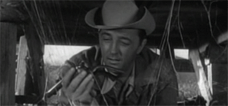
The Lusty Men
1952 -

Johnny Guitar
1954 -

High Green Wall
1954 -

Rebel Without a Cause
1955 -

Bigger Than Life
1956 -

Hot Blood
1956 -

The True Story of Jesse James
1957 -

Bitter Victory
1957 -

Party Girl
1958 -

King of Kings
1961 -

55 Days at Peking
1963 -

The Janitor
1974 -

We Can’t Go Home Again
1973-1976 -

Lightning Over Water
1980
We don’t do comments anymore, but you may contact us here or find us on Twitter or Facebook.



